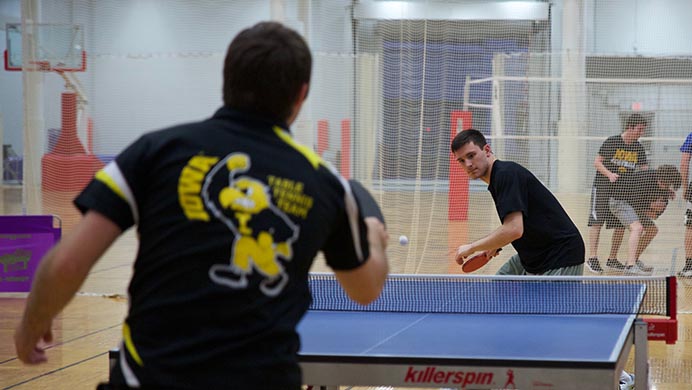With clubs located in Iowa City, Davenport, Cedar Rapids, and Ames, table tennis, also known as Ping-Pong, is quietly gaining a following in Iowa.
There are many benefits to playing with the table-tennis club, said Dongwang Liu, an associate director of the University of Iowa Center for Asian and Pacific Studies and a member of the Iowa City Table Tennis Club since 2008. The club allows members a chance to exercise and socialize.Iowa City resident Jarol Duerksen, who has been playing table tennis for 61 years, said that table tennis is especially important because “according to the book Making a Good Brain Great, by Daniel Amen, by playing any sport, people gain new brain cells, and with table tennis, you play with all four limbs. It is also completely strategy-based, which makes it a mental and physical workout. There is also a low risk for injury, unlike football and soccer.”
There are a lot of people who do not think of table tennis as a sport because it’s accessible in a lot of basements, including ours, Duerksen said. However, a lot of skill goes into the game, and when people observe a match, they can see how competitive it can be.
Liu said there is a large list of names in the club, but every week about seven to 13 people show up to practice. He said participants can be students or community members because the club is inclusive.
“It’s a fun way to hang out with friends and decompress from a stressful week,” said Arnold Kompaniyets, the president of the competitive UI Table Tennis Team.
Kompaniyets said the Iowa City club started in the late-1970s and became an official club in the 1980s, so some members have been playing for decades.
The team practices are the same as the club practices, and anyone is able to join the club regardless of age or experience, Kompaniyets said.
“We’re a good group of people supporting each other,” Liu said.
The competitions are held in the Midwest by the National College Table Tennis Association, the governing body of table tennis, Kompaniyets said. The regional competitions are a combination of three to four surrounding states in which two winning teams that can move on to nationals.
Duerksen and wife Leah Duerksen — longtime lovers of table tennis — have volunteered for the Table Tennis Association for seven years, she said, and they also helped Kompaniyets start the university’s competitive team.
The Duerksens said they contacted Kompaniyets, who had been a member of the club since 2010 because they knew he loved table tennis.
Then they gathered enough students that were passionate about table tennis for the team, Kompaniyets said.
The team is funded partially by the UI, but it makes most of the money through annual membership dues and fundraiser tournaments, which help the team travel to competitions, Kompaniyets said.
During its first year, the team started with six tables, but now it has 24, and plenty of table-tennis balls, he said. The only material members need to provide for themselves are paddles.
Kompaniyets said people are usually surprised at how quickly they pick up table tennis. There were people in the very beginning stages of the game, but this year, they qualified for the varsity-level regionals.







